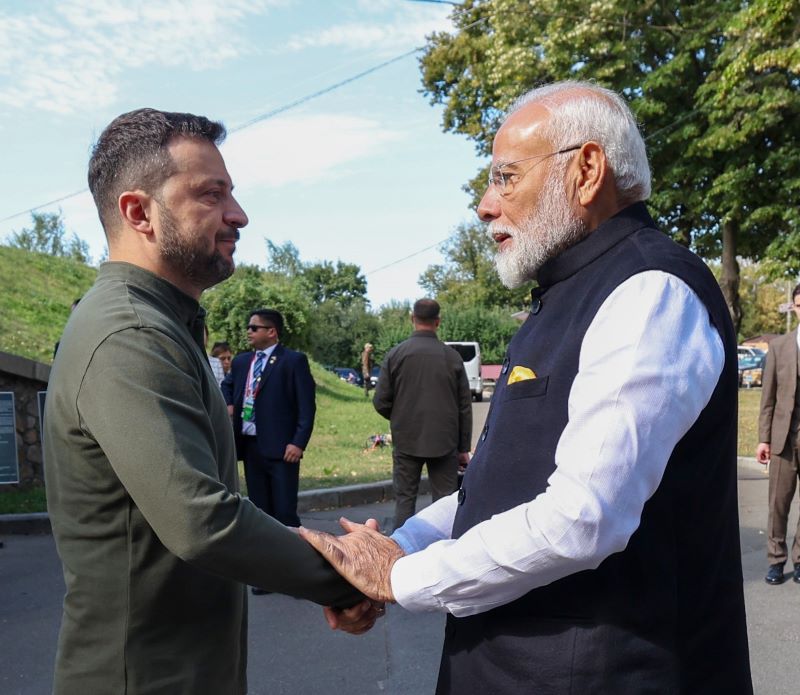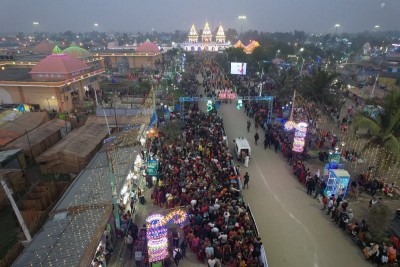 India-Ukraine
India-Ukraine
India’s global ascent: PM Modi’s Ukraine visit signals a new era
Prime Minister Narendra Modi’s recent visit to Ukraine marks a pivotal moment in India’s ascent as a significant player in global geopolitics.
While his journey to Kyiv lacked the dramatic unveiling of new peace initiatives, it symbolized something far more profound: India’s readiness to engage with the complex realities of global conflicts and shape the outcomes that will define the future of international relations.
Modi’s decision to travel by train from Warsaw to Kyiv, engaging President Volodymyr Zelenskyy in an intense dialogue, reflects a nuanced understanding of Ukraine’s dire situation. Ukraine, a nation fighting for its very survival, needed not another peace plan, but a deeper comprehension of its existential concerns—especially from a country like India, whose influence is growing within the Global South. Modi’s visit provided Ukraine with exactly that: a recognition of its plight and a commitment to consider its perspective in the broader peace efforts.
Zelenskyy’s hope that Modi’s willingness to listen and contribute will shift the Global South’s stance on the war is significant. Until now, much of the Global South, including India, has maintained a distance from the conflict, despite its severe economic repercussions. Modi’s engagement could well be the catalyst that changes this dynamic, bringing the concerns of the Global South into the mainstream of global diplomatic efforts to resolve the conflict.
Beyond the immediate context of the war, Modi’s visit signals India’s transition from a passive observer to an active participant in shaping global conflicts. For centuries, India was merely a spectator to European wars, its fate intertwined with the ebb and flow of colonial power struggles. Today, India is stepping into a role where it seeks not just to observe but to influence the outcomes of conflicts that have far-reaching consequences for global order. Modi’s presence in Kyiv underscores India’s determination to play a proactive role in the most significant European conflict of our times.
The timing of Modi’s visit also highlights the broader geopolitical competition unfolding in Ukraine. As China’s Premier Li Qiang concluded his visit to Moscow, it became clear that Ukraine is not just a battleground between Russia and the West, but also a stage where Asia’s rising powers, India and China, are vying to influence the future of Europe. Modi’s visit to Kyiv, juxtaposed against China’s diplomatic maneuvers, is a clear statement: India is ready to assert its influence in Europe, challenging the traditional power dynamics and ensuring its voice is heard in the reordering of global relations.
As Modi met with Zelenskyy, across the Atlantic, Kamala Harris, in her speech accepting the Democratic nomination for the U.S. presidency, reaffirmed America’s commitment to Ukraine and NATO. This strong stance from the U.S. challenges the notion that America is a “weary titan” on the verge of retreating from Europe. For India, this development is crucial. The future of U.S. involvement in Europe will have direct implications for India’s security policies, especially as it continues to deepen its strategic ties with the United States, as evidenced by Defence Minister Rajnath Singh’s presence in Washington.
Modi’s diplomatic balancing act—engaging with both President Vladimir Putin and President Zelenskyy in quick succession—reflects India’s broader strategy of protecting its national interests amid the shifting landscape of great power relations. India is no longer content to be a pawn in the games of others; it is now a player with its own set of priorities and strategies, determined to navigate the tremors of global power shifts with confidence and foresight.
Moreover, Modi’s visit to Kyiv also represents a rekindling of the historical ties between India and Ukraine. During the Soviet era, India enjoyed privileged relations with Ukraine, but these bonds faded after the dissolution of the USSR. The warm reception Modi received in Kyiv, and the commitment to elevate the bilateral relationship to a “strategic partnership,” signifies a renewal of these ties. The promise to reboot economic and defense relations and revitalize cultural connections marks the end of a long period of neglect, paving the way for a robust partnership that can contribute to stability in the region.
Most importantly, Modi’s visit should encourage a more nuanced and sophisticated debate within India regarding the war in Ukraine. For too long, India’s discourse on the conflict has been marred by political biases and a lack of understanding of Central European history. By engaging directly with the realities on the ground, India can foster a more informed and balanced perspective on a conflict that has global implications.
(Photo and text courtesy: Khalsavox.com)
Support Our Journalism
We cannot do without you.. your contribution supports unbiased journalism
IBNS is not driven by any ism- not wokeism, not racism, not skewed secularism, not hyper right-wing or left liberal ideals, nor by any hardline religious beliefs or hyper nationalism. We want to serve you good old objective news, as they are. We do not judge or preach. We let people decide for themselves. We only try to present factual and well-sourced news.







